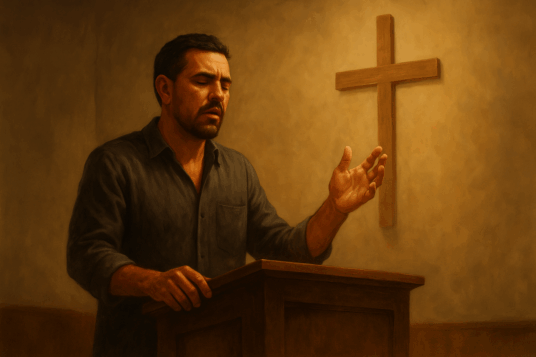Prophetic preaching is more than to that one person who’s dealing with a certain issue. The biblical prophets never treated sin as a purely private matter. Idolatry produced injustice; injustice exposed idolatry. The worship problem and the social problem were two sides of the same rebellion. So they spoke to altars and to markets, to priests and to rulers, to sexual perversion and to economic oppression, to false doctrine and to violence against the vulnerable. They were not “doing politics.” They were obeying God in a world where sin organizes itself. To pretend public evil is off limits from the pulpit is to pretend Scripture is smaller than reality.
We are watching substitute gospels multiply. On one side, a therapeutic gospel: God as a life coach who validates desires so long as we feel sincere. On another, an activist gospel: moral certainty wielded as a weapon, with “prophetic” reduced to performative outrage or virtue display. On yet another, a nationalist gospel: wrapping cross and country so tightly that repentance becomes optional so long as the symbols are respected. Prophetic preaching confronts each counterfeit—personal permissiveness, ideological zeal, and civil-religious idolatry—by re-centering the holy God, the crucified and risen Christ, and the coming judgment.
The Heart of God
A true prophetic word carries divine pathos—that is, it reflects that God is not an abstract force but the living Lord who is grieved by covenant breach and moved by human misery. Abraham Joshua Heschel observed that the prophet “feels His heart” and therefore cannot remain indifferent. That is the difference between rant and burden. Anger looks for targets; burden looks for repentance.
Some preachers choose to ignore it all. However, silence masquerades as prudence: “If I just keep to private spirituality, I’ll avoid division.” But neutrality in the face of public rebellion is not peace; it is abdication. The prophetic preacher, instead, pierces cultivated indifference. He refuses to let hearers drift into a posture of detached spectatorship while human dignity erodes and God’s standards are trampled.
Still, urgency without being in step with the Spirit quickly burns out or burns people. Thomas Merton noted that authentic solitude matures into compassion. Howard Thurman said real social change must be grounded in spiritual encounter. The pattern stands: communion with God drives engagement. Without holy communion, prophetic preaching becomes noise. From prayer, a message is birthed. The secret place shapes the public word. Without fasting, intercession, self-examination, and repentance in the preacher, “prophetic” becomes a costume.
The prophets cut open wounds to irrigate them with covenant mercy. So the sermon that names sexual confusion must also announce forgiveness and reorientation in Christ. The sermon that exposes greed must also call to contentment and generous restitution. The sermon that confronts false teaching must also hand people the solid food of doctrinal clarity. Fire that only scorches is arson; holy fire purifies.
This kind of preaching will be accused of being “too political” by those who prefer a safe church and “not political enough” by those who crave constant activation. Let the accusations come. The measure is not applause or backlash but fidelity to God’s Word: Did we say what God wanted said? Or did we refuse because of fear?
Testing Against Balance
Here are some practical tests that can help discern a prophetic message. If a sermon names societal sins but never personal ones, it is drifting into propaganda. If it rebukes private vice but never unmasks structural or cultural idols, it is domesticating holiness. If it magnifies failure without pointing to the cross, it breeds despair. If it offers hope without repentance, it manufactures illusion.
The prophetic preacher must aim for the fourfold balance: truth, grief, call, hope.
- Truth declares reality as God defines it.
- Grief shows the preacher stands under the same verdict.
- Call summons hearers to turn.
- Hope directs them to Christ’s finished work and coming reign.
A people formed by prophetic preaching—patiently, consistently, repentantly—will learn to discern well.
So we preach. We shall preach prophetically because God still speaks through His written Word, and a generation starved for reality must hear it. Anything less is malpractice.
